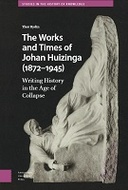Explore

The Works and Times of Johan Huizinga (1872–1945)
Thor Rydin
2024
0 Ungluers have
Faved this Work
Login to Fave
The lifetime of Johan Huizinga (1872–1945) was marked by dramatic transformations in Europe. Cityscapes, aesthetic codes, social orders, political cultures, international travel and means of warfare developed beyond recognition; entire catalogues of hopes and fears were torn asunder and replaced by new ones during not one but two wars. Amidst all these changes, Huizinga grew to become one of the most famous historians of his time. To this day, his works are treated as monuments in the cultural historical field.
This book examines how these transformations and ‘experiences of loss’ affected and informed Huizinga’s historical perspectives. Most centrally, this book contends that Huizinga’s historical works helped to accommodate and give meaning to his own experiences of uncertainty and rupture, thus offering him a way of life in turbulent times. This project offers an original and comprehensive analysis of an iconic historian writing in the age of collapse
This book is included in DOAB.
Why read this book? Have your say.
You must be logged in to comment.
Rights Information
Are you the author or publisher of this work? If so, you can claim it as yours by registering as an Unglue.it rights holder.Downloads
This work has been downloaded 38 times via unglue.it ebook links.
- 38 - pdf (CC BY-NC) at Unglue.it.
Keywords
- Ethics & moral philosophy
- European History
- History
- Humanities
- Mathematics & science
- Philosophy
- philosophy of science
- Regional & national history
- Science: general issues
- thema EDItEUR::N History and Archaeology::NH History::NHD European history
- thema EDItEUR::P Mathematics and Science::PD Science: general issues::PDA Philosophy of science
- thema EDItEUR::Q Philosophy and Religion::QD Philosophy::QDT Topics in philosophy::QDTQ Ethics and moral philosophy
Links
DOI: 10.5117/9789463724593Editions

